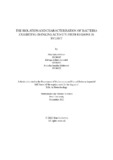The isolation and characterization of bacteria exhibiting deinking activity from regions in Sylhet
Abstract
The wastage of paper and ink is a major cause of pollution in Bangladesh. The ever-rising population demands an increased requirement for paper and ink that often end up occupying landfills or contributing to air pollution. However, the current methods of paper recycling involve paper de-inking, which is largely dependent on chemical means that further aggravates this problem. The objective of this research was to find an alternative biological solution to the chemical de-inking process. Bacteria capable of decolorizing ink were identified and isolated using media that contained ink as the only carbon source. Five samples of bacteria capable of efficient decolorization were found with decolorization percentages of 42.93%, 39.75%, 37.95%, 37.55%, and 30.02% for isolates RGS-1, SPS-1, RGS-2, SPS-2, and SPS-3, respectively. Isolates SPS-1, SPS-2, and SPS-3 also exhibited cellulolytic activity. Protein crystals from the bacterial culture supernatant were precipitated and purified using ammonium sulfate precipitation followed by snake-skin dialysis respectively, after which de-inking activity increased. The optimal de-inking was observed when extracellular and intracellular extracts were combined and added to ink; isolate SPS-2 showed a decolorization percentage of 70.75%. The bacteria provide an avenue of research for the sustainable recycling of paper, thereby alleviating the climate problem.

